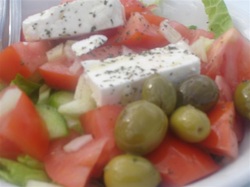|
|
 Some people hate them and some people love them. I personally love them. When I start eating them I find it hard to stop ! How Much To Eat: One olive (no stone) weighs approximately 3g. Olives are high in salt, so people with high blood pressure should moderate their intake. About a small handful a day is good measure. That may be approximately 6 olives. Use olive oil as a dressing or to cook with. Note that one tablespoon of olive oil is 120 calories. No more than one tablespoon with every meal ! Key Benefits: Flavones are one of the phenolic phytochemicals in olives. Olive oil contains a range of other phenolics. Phenolics, along with vitamin E, give the olive and olive oil, its well known antioxidant power. Maximising the Benefits: Virgin olive oil is “pressed” from olives; “extra virgin” olive oil is richest in phenolic compounds. Raw olives are bitter due to a phenolic compound, oleuropein, and are made edible by being pickled or marinaded in salt or oil. Cancer: Population studies link diets high in monounsaturated fat and / or olive oil with a reduced risk of breast cancer. Memory: A Mediterranean diet high in extra virgin olive oil might help to protect against age-related decline in mental function. Heart Health: Olive oil is rich in monounsaturated fats, which have beneficial effects on the body’s cholesterol levels. Human studies investigating diets rich in olive oil also show blood pressure-lowering and anti-blood clotting effects. All benefit health and help explain the longevity of people who enjoy a Mediterranean diet. Here are some more health benefits of eating olives:
0 Comments
Leave a Reply. |
AuthorBarbara is a qualified nutritionist offering Health, Nutrition & Lifestyle Counseling. She gives Healthy weight loss advice and promotes the Mediterranean diet. She is the author of the Med Life Diet - creating healthy lifestyle habits and attitudes for life ! Archives
April 2024
|
 RSS Feed
RSS Feed
